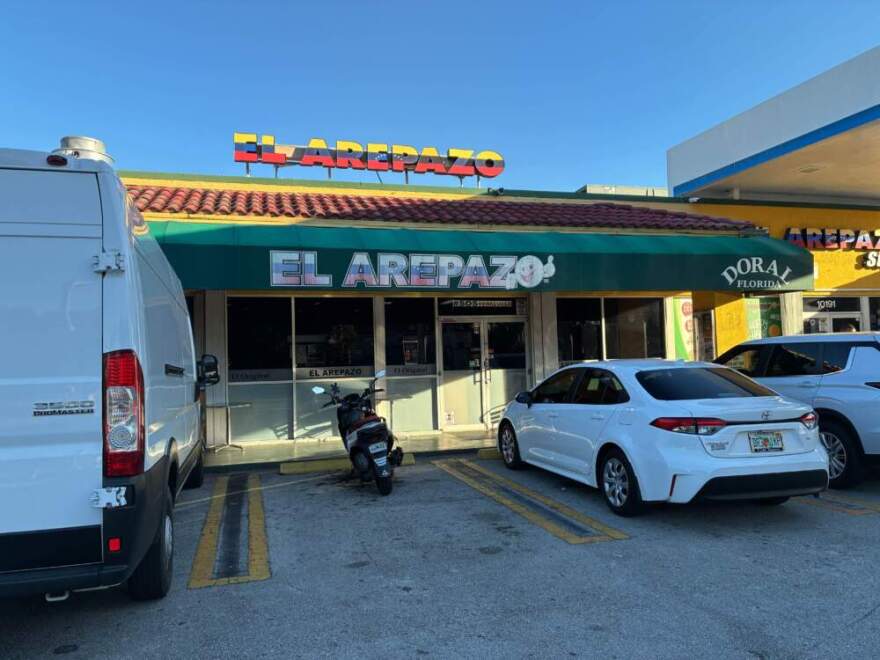For Venezuelan natives living in the U.S., deportation fears are soaring.
The Trump administration this month ended Temporary Protected Status for hundreds of thousands of Venezuelans. People with TPS went from having work permits, drivers’ licenses and protection from deportation to no legal status.
The fear may be most acute in Doral, Florida, the American city with the most Venezuelans.
A Venezuelan restaurant called El Arepazo, an institution in town, serves empanadas and cheese sticks and is usually bustling with patrons. But on a recent morning, there were hardly any customers during the breakfast rush.
“It used to be way fuller than it is right now,” immigration activist Adelys Ferro said. “The owner said in an interview that we had not that long ago, he said that almost 50% of the flow of customers decreased during the last few months, and obviously, that is because of the immigration crackdown that the government is doing all over.”

With the recent ending of TPS, Ferro says many of her clients have lost legal permission to live and work in the U.S. and buy health insurance.
“I can tell you about a man in his 50s that used to have TPS. He was paying for his health insurance,” Ferro said. “He was on the transplant organ list because he has this very difficult illness. And long story short, he lost it, and he was kicked out of the transplant waiting list.”
She also knows a new mom who just gave birth to a premature baby who is still at the neonatal unit at a local hospital. Now, the mother has lost her TPS, but still needs to visit her baby at the hospital, where Immigration and Customs Enforcement agents are.
“This is where we are. I can tell you about kids with cancer,” Ferro said. “I got people that were number one in their high schools. Number one in their universities.”
A lot of people are scared and staying home, Ferro said.
Others have gone back to Venezuela or are planning to, including the brother of Oscar Torres, a Venezuelan American in the car business in Doral.
“He doesn’t want to live where he’s not able to work, he’s not able to drive, he’s not able to do his everyday chores just because he’s afraid that he’s going to get locked up and then eventually sent back home,” Torres said.
Technically, Oscar said it’s his stepbrother. He explains that, decades ago, his Venezuelan American parents adopted a boy born to a poor family in Caracas.
“The kid made something out of himself. He’s a college grad,” Torres said. “He said, ‘If I’m going to get picked up by ICE and be sent to a camp where criminals are sent to, I’d rather go back and not go through that ordeal.’”
The ending of TPS was pushed by the Trump administration, which makes the politics in Doral conflicted. It’s a conservative city with many immigrants who are fiercely anti-communist.
The city council this year signed an agreement with the Trump administration to cooperate with ICE that lets local police officers question people’s immigration status and assist in detaining them.
Now, some fearful residents are blaming Republican Mayor Christi Fraga. On Instagram, one person posted, “This falls on you.” Another said her support for the president “will haunt you for eternity.”
Despite the criticism, Fraga says her support for Trump hasn’t wavered.
“I absolutely support the strong leadership that he’s had. And I know it’s not easy and sometimes we make decisions that are very tough,” Fraga said. “I don’t have to agree with all the decisions. Right now, it’s hard for me to reconcile. How can you say that this is a narco-trafficking terrorist country, basically, that’s dangerous, and you’re saying, ‘Let’s send all these people back that are good families.’?”
Fraga said she worries for people sent back to Venezuela.
“I think about it because my family lived it as well, that fear. I know families that are living it, that are fearful of what they could confront,” Fraga said. “I’m hoping that there will be action taken. I don’t think it’s any more of ‘what if,’ it’s a ‘when’ there’ll be action taken of seeing, hopefully, that government come down.”
A Cuban American herself, Fraga said the deportation uncertainty is personal in another way: Some of her son’s friends in school went back to Venezuela over the summer and didn’t return because their families didn’t want to live with “anxiety and little kids.”
“As a Latina, you know, Hispanic woman, my grandparents left in the middle of the night,” Fraga said. “It’s hurtful to think about, and it’s hard.”
This article was originally published on WBUR.org.
Copyright 2025 WBUR
